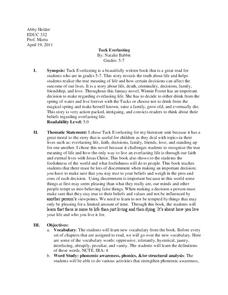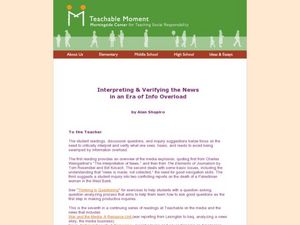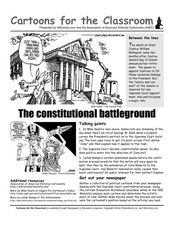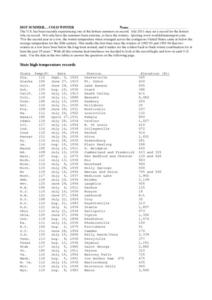Curated OER
Discussion Web for The Catcher in the Rye
Is Holden Caulfield a reliable narrator? Readers use the provided graphic organizer to record specific textual evidence from The Catcher in the Rye to support their response. A teacher copy of the template is provided.
Curated OER
Tuck Everlasting
Clearly written as an assignment for a higher-level education class, this formal lesson plan contains some fun and well-researched strategies for teaching the novel Tuck Everlasting by Natalie Babbitt. Among the best ideas...
Orlando Shakes
Les Misérables: Study Guide
A writer has the responsibility to defend the less fortunate members of society. At least that was the view of Victor Hugo, author of Les Miserables. The novel is the subject of a study guide from Orlando Shakespeare Theater....
Curated OER
English Vocabulary Skills: AWL Sublist 5 - Exercise 2c
In this online interactive English vocabulary skills worksheet, learners answer 10 matching questions which require them to fill in the blanks in 10 sentences. Students may submit their answers to be scored.
Curated OER
Elements of Fiction
Students identify key story elements in a fiction text. In this literacy lesson, students are introduced to the various elements of fiction such as the setting, plot, and theme. Students read a short story of their choice and identify...
Curated OER
Cartoons for the Classroom: Taking a Stand
In this current events worksheet, students analyze political cartoons that feature the use of persuasion and propaganda. Students respond to 2 short answer questions.
Curated OER
Traditional Values vs. Modern Culture in the Asian Community
Students examine Chinese culture and values. They research the teachings of Confucius, create posters, write short stories, and analyze the history of and present state of gang culture through research, discussion, and writing.
Curated OER
Breaking News English: Tsunamis
In this tsunamis worksheet, students read the article, answer true and false questions, complete synonym matching, complete phrase matching, complete a gap fill, answer short answer questions, answer discussion questions, write, and more...
Curated OER
Cartoons for the Classroom: 9/11 Revisited
Political cartoons about the September 11 terrorist attacks provide an opportunity for class members to analyze the inferences embedded in the drawings.
Curated OER
Cartoons for the Classroom: Keep Current Through a Cartoonist's Commentary
In this current events worksheet, students analyze political cartoons about the Middle East and American domestic issues. Students respond to 4 talking point questions.
Curated OER
Hazardous Chemicals in Your Neighborhood
Students examine the effect of hazardous chemicals on humans. They discover how the chemicals are cleaned up and the facilities in their neighborhood. They identify federal and local agencies that oversee environmental hazards
Curated OER
Deportation and Loss
Seventh graders discuss the issues of isolation and deportation as they are related to the Holocaust. After reading a brief passage about deportation and confinement in a concentration camp, 7th graders discuss the feelings involved in...
Curated OER
Interpreting & Verifying the News in an Era of Info Overload
Students practice their critical thinking skills. In this media awareness lesson, students read articles about media overload and interpretation of media. Students respond to discussion questions and discuss how they verify...
Curated OER
Cartoons for the Classroom: Drawing Attention
In this current events worksheet, students analyze political cartoons about the scores of people dying in Sudan. Students respond to 5 talking point questions.
Curated OER
Cartoons for the Classroom: The Constitutional Battleground
For this primary source analysis worksheet, students analyze political cartoons about the Supreme Court and Constitutional issues and respond to 5 talking point questions.
Curated OER
Lincoln is in the House! ("Name-Dropping" Poems and the Power of Connotation)
“What’s in a name?” Just about everything. Barack Obama, Vincent van Gogh, Justin Bieber. Famous names evoke a multitude of reactions and poets often use the names of famous people in their works precisely because names carry...
Curated OER
Those Wacky Greek and Roman Gods: A Quick Cheat-Sheet
Here's a handy two-page reference that briefly identifies major Greek and Roman mythological figures.
Yummy Math
Hot Summer. . . Cold Winter
A table of each state's record temperature reports data that middle schoolers can place on a number line for analysis. A written explanation of how to use this tool and the concept of absolute value are also included. Nine questions are...
Curated OER
El Dia de los Muertos (Day of the Dead)
Fifth graders describe ways in which people in the United States remember and honor the dead. They identify the similarities and differences between El Dia de los Muertos, Memorial Day, and Halloween.
Curated OER
Lose a Vote, Gain a Vote
Students explore the issues behind close Senatorial races. They investigate the qualities of political leaders, the 2002 senatorial elections and the differences and similarities between the Republican and Democratic parties.
Curated OER
Ode to a Nightingale
Students read poems about Tuberculosis by John Keats. Using the poems, they identify similies, metaphors, personification and imagery. In groups, they make connections about the author's outlook on life and how his disease impacted his...
Curated OER
Facing Life's Challenges
Students analyze divination and carry out experiments using a probability model. In this probability lesson plan, students review information about divination and predictions in various cultures. Students set up experiments to test...
Curated OER
A Kingship Rested in Peace
Learners investigate, by decades, important events in Middle Eastern history, King Hussein of Jordan's influence on these events and how it affected U.S. foreign policy and produce a timeline representing the five decades in King Hussein...
Curated OER
Natural Disasters
Students investigate why natural catastrophes occur around the world and the results of such catastrophes. They investigate how people recover from catastrophes and can they be prevented. Students create their own work of art depicting a...























